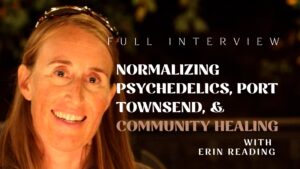Starting a Grassroots Psychedelic Movement || Ramzy Abueita
Meet Ramzy Abueita
Ramzy Abueita is a leader in the psychedelic renaissance and community weaver. He was part of the decriminalization movement in Ann Arbor, Michigan and Colorado statewide and now he lives in Boulder, Colorado. In this interview Ramzy shares with us how he started a grassroots psychedelic movement in Boulder that changed policy!
Ramzy has a degree in neuroscience from the University of Michigan and has presented on the neuroscience and neurobiology of psychedelics to the Center for Consciousness Science at the University of Michigan Medical School, the Michigan Psychedelic Society, and to the public. Ramzy is the owner of Myco Cafe, a mushroom-themed coffeeshop and art cafe in Boulder.
Connect with Ramzy on Instagram
Sign up for Ramzy’s personal Substack
Watch: Unveiling the Psychedelic Renaissance: A Spiritual Activists Grassroots Movement
Watch the full interview with Ramzy
How did you get started in the Decriminalization Movement?
Ramzy:
My involvement in the decriminalization movement actually started in Ann Arbor, where I had studied neuroscience at the University of Michigan, and I was still living in Ann Arbor after I graduated.
There was a new movement that had emerged in Ann Arbor coming from the Michigan Psychedelic Society as a group called Decriminalize Nature, Ann Arbor and Decriminalize Nature Ann Arbor was following in the footsteps of Oakland, California, and Santa Cruz, California, which were the first two cities to implement a decriminalized portion of all the entheogenic plants and fungi.
How were you able to start a local psychedelic movement in Ann Arbor, Michigan?
In Ann Arbor, we were following a really simple strategy. We wanted to see what would happen if we got members of our community to basically tell their stories to members of City council, the local elected leaders.
And those stories are very simple and very personal. You know, people just went on the record and told what their experiences were like.
You know, they told stories of healing from postpartum depression.
They told stories of recovering from PTSD.
They told stories of rekindling relationships with family members that they’d lost touch with.
And these stories are very heartfelt.
It was as simple as getting people to record videos, video testimonies of their stories and just telling those stories, sending those videos to members of the city council.
It took a few weeks of directly speaking to City council before a member of the City Council introduced the resolution to the vote. We were a little bit taken aback by the speed and the rate at which Ann Arbor went ahead with decriminalization.
We thought they were just going to introduce the resolution and talk about it and then table it and bring it up at another meeting. And then, the next meeting, they were going to talk about it some more and then table it again and maybe, you know, three or four meetings later, they would finally be ready to bring it to a vote.
But to our surprise, the very day that they introduced the resolution to the Ann Arbor City Council, they put it to a vote.
And then all of a sudden, the Ann Arbor City Council voted to decriminalize 11 to 0. It was unanimous. It was a unanimous vote that completely caught us off guard. We weren’t expecting it to be unanimous.
We weren’t even expecting them to vote. But, you know, it’s a testament to the power of how our stories influence our local elected leaders.
How should community members record their personal testimonials to send to their City Council ?
Ramzy:
We are very peculiar about having this be a true grassroots movement. And what that means is we let people show up and speak from their hearts.
We give some very rough guidelines such as be sure to start by introducing yourself and then make sure your statement is under 2 minutes and practice your statement.
But really, we just let them go up and on the podium and tell their stories straight from their hearts and we get testimonies from very different angles.
Some people approach it from their very personal experiences. Some people talk about it from the scientific side. They talk about all the scientific evidence and the research articles and the studies and other people talk about being therapists and in their therapy practice, seeing all the transformation in their clients. Other people talk about it from a cultural perspective. Other people talk about to the deep legacy of Indigenous practice.
In letting people show up and speak from their authentic voice, It allows us to get a constellation of perspectives of how people in the community engage and relate with these substances.
Can we trust our local elected officials?
Ramzy:
You know, you can be cynical about what politicians can be like as you get higher up the rungs, higher up the echelons of the political sphere. I would say the higher up that ladder you go, the more influenced by money, the more pay to play politics becomes.
On the local level, that’s where you have the true grassroots voices. That’s where the local elected leaders, the members of the community that are your neighbors, they’re people who are walking their dogs in the morning and run into people in the community.
So when the community speaks, they listen. They tend to be compelled.



